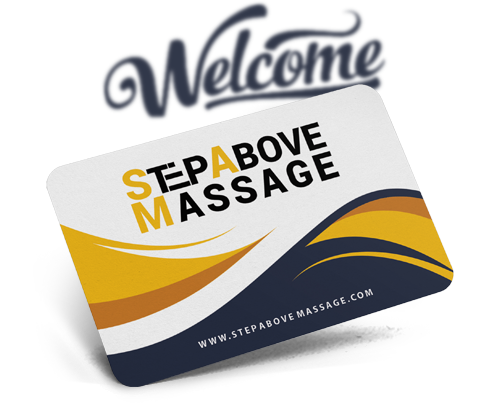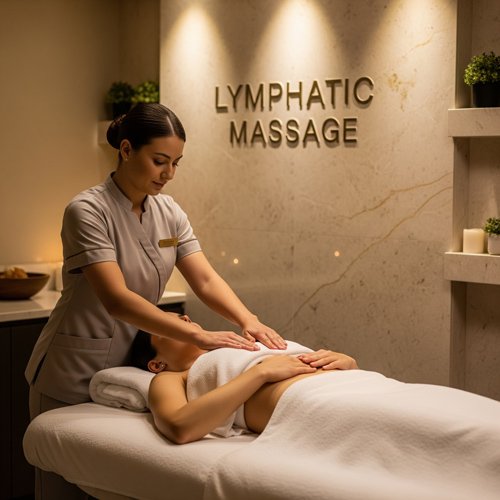Lymphatic Drainage

Discover the rejuvenating power of lymphatic drainage massage at Step Above Massage Office, proudly serving Raleigh, NC, and Wake Forest, NC. Our skilled therapists deliver a calming, therapeutic session designed to enhance your body’s natural detoxification, reduce swelling, and promote immune health. Perfect for those seeking relief from fluid retention or a boost in overall vitality, our tailored treatments use gentle, rhythmic techniques to support lymph flow in a peaceful environment. Conveniently located for Raleigh and Wake Forest residents, we’re ready to help you feel refreshed. Schedule your appointment today online or by phone and embrace a healthier you!
This therapy is designed for individuals looking to optimize their wellness through targeted lymphatic support. Conducted in a serene, private setting, it features a certified therapist using specialized strokes to stimulate the lymphatic system. Ideal for managing post-surgical edema, improving circulation, or simply enhancing relaxation, each session is customized to your unique needs.
Book Your Lymphatic massage Today
Ready to rejuvenate your body and boost your wellness? Schedule a soothing lymphatic drainage massage at Step Above Massage. This gentle therapy supports detoxification, reduces swelling, and enhances your immune system. Book your session today online or call us to reserve your spot!
You can reach our location in just 15 minutes from Raleigh, Wake Forest, Rolesville, or Youngsville.
Why Choose Step Above Massage for Your lymphatic massage
Therapeutic Expertise and Skill
At this center, lymphatic massage is performed by specialists who, according to client feedback, possess a high level of knowledge and skill in this field. This expertise ensures you receive an effective service tailored to your therapeutic needs.
Focus on Individual Needs
Step Above provides a completely personalized approach by understanding the unique condition of each client. Every massage session is designed around your health goals to achieve the best possible results in reducing swelling, detoxification, and boosting the immune system.
Value and Quality of Service
Step Above creates exceptional value for your health by offering specialized, high-quality services at a fair price. This center helps you achieve improved lymphatic function and overall wellness through a smart investment in your health.
A Calm and Professional Environment
By offering a calm, clean, and professional space, this establishment creates an experience that goes beyond a simple massage. From your arrival to the end of your session, the focus is on your relaxation and comfort, allowing you to benefit from the services with complete confidence.
Our lymphatic drainage massage prices & deals

90 Minutes of massage
$145
Benefits of lymphatic massage
Reduces Swelling and Edema
Manual Lymphatic Drainage is highly effective at reducing swelling caused by fluid retention (edema), particularly after surgery or injury. By gently redirecting excess lymph fluid from congested areas back into circulation, it provides relief, decreases discomfort, and can improve mobility in affected limbs.
Enhances Immune Function
The lymphatic system is a cornerstone of your immune defense. This specialized massage stimulates the flow of lymph through the lymph nodes, where pathogens are filtered and destroyed. This process helps accelerate the removal of waste and bacteria, strengthening your body’s ability to fight off infections and illness.
Promotes Detoxification and Healing
By improving lymphatic circulation, this massage technique helps efficiently flush metabolic waste, toxins, and cellular debris from your body. This cleansing effect reduces sluggishness and fatigue while also speeding up recovery from injuries, surgeries, and intense workouts by clearing the way for fresh, nutrient-rich fluids.
Improves Skin Health and Reduces Cellulite
Increased lymphatic flow delivers more nutrients to the skin and removes waste, which can lead to a clearer, healthier complexion and reduced puffiness. For many, it also helps minimize the appearance of cellulite by breaking down the toxins and stagnant fluid that contribute to its formation, resulting in smoother-looking skin.

What to Expect During Your Lymphatic Massage
Expect a lymphatic massage to be a very gentle and relaxing experience, completely different from a deep tissue massage. Your therapist will use extremely light, rhythmic, wave-like strokes to gently stretch your skin and encourage the natural movement of lymph fluid. The process is painless and soothing, designed to reduce swelling and promote detoxification, often leaving you feeling lighter and less congested afterward.
What you should do before a lymphatic draiage
To get the most out of your lymphatic drainage massage, focus on hydration and relaxation beforehand. Be sure to drink plenty of water the day before and the day of your session to help your system flush out toxins, while avoiding dehydrating substances like alcohol and caffeine. It’s also best to have a light meal and wear loose, comfortable clothing to your appointment to ensure you are comfortable and don’t constrict circulation afterward. Plan to arrive a few minutes early to calmly check in, and be prepared to discuss your health history and goals with your therapist for a safe and effective session.

